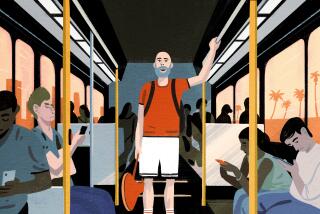Those Big City Lights vs. Life in the Countryside : THE LILAC BUS, <i> by Maeve Binchy,</i> Delacorte Press, $20; 336 pages
In different times, Ireland had James Joyce as its dour spokesman; now, the people who really speak for that sad and lovely isle are the lyrical, metaphysical Van-the-Man Morrison, and--far more down to earth--the prolific novelist, Maeve Binchy.
This writer has zigzagged from earlier work that is frankly âwomenâs fiction,â romantic stuff, very heavy on love, to a more astringent, common-sensical, journalistic view of what it means to be Irish in these days--and itâs not all good news.
In her last ambitious novel, âCircle of Friends,â two plots coiled within each other. The first, the conventional âwomenâsâ stuff, concerned the plight of a village girl grown--not fat, but large--and thus doomed to be passed over in the narrow social life in which she found herself.
Half that story was concerned with such mundane things as how to dress if you are the size of a heifer, and just how far a âgood personalityâ--that eternal consolation of the unattractive girl--can take you.
But the other half of âCircle of Friendsâ concerned the tension between Dublin and all the out-of-the-way villages that feed into that capital, and how, in many villages, the rural economy has jump-started itself, making these tiny communities the idyllic refuges they always should have been.
âThe Lilac Busâ continues to explore this dynamic--looking at the reasons why young people have to get away from stifling small towns to live a life of comparative freedom in Dublin but observing the village ties that bind: the obligations, the seductions, the pure destiny of a permanent âhomeâ and all that âhomeâ means.
Eight people take a lilac minivan from a street corner in Dublin every Friday night and, after several hours, they land in their tiny hometown of Rathdoon. Then, on Sunday evenings, the same eight are re-deposited back in the city.
The seven passengers and their driver all, in effect, live double lives. One girl is a miser. One boy is in trouble with the law. Another young man is gay but canât let his parents in the village know it. Another woman has an alcoholic mother; another man, a bulemic sister.
All eight suffer from fairly severe loneliness, and some of them seem suspiciously stereotypical.
But all these problems hark back to âCircle of Friendsâ and the invisible but terribly strong ties that hold city and countryside together.
The last third of this book switches to Dublin itself, and four more character sketches.
Again, the point of comparison is not James Joyceâs âDublinersâ but Van Morrisonâs lyrical musings on âYou and I and Nature, Together, in the Garden.â âOh, yeah?â Maeve Binchy seems to reply, âSome garden!â
The tyranny of the church, the hypnotism of strong drink, the lack of decent jobs, the obsession with appearances that demands double lives--all these are Binchyâs concerns in this collection. She loves Ireland, but she deplores its faults.
Taken together, she and Van Morrison show us that countryâs lyrical soul lodged uncomfortably in a sour, grubby, physical body. Real life is tougher, Binchy says, than the poets will ever admit.
Next: Bettyanne Kevles reviews âThe Malaria Capersâ by Robert S. Desowitz (W. W. Norton).
More to Read
Sign up for our Book Club newsletter
Get the latest news, events and more from the Los Angeles Times Book Club, and help us get L.A. reading and talking.
You may occasionally receive promotional content from the Los Angeles Times.







